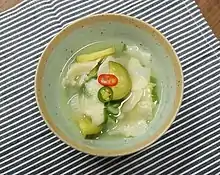수제비
Korean

Alternative forms
- 더부렁죽 (deobureongjuk), 밀제비 (miljebi), 밀짱국 (miljjangguk), 밀떡국 (miltteokguk), 벙드레죽 (beongdeurejuk), 수지기 (sujigi), 제비 (jebi) — Gyeongsang
- 뜨데기 (tteudegi), 풀떼죽 (pulttejuk) — Gangwon
- 뜨데기 (tteudegi) — Seoul
- 띤죽 (ttinjuk), 밀죽 (miljuk) — Jeolla dialect
- 뚝제빅 (ttukjebik), 풀떼죽 (pulttejuk) — Chungcheong
- 국제비 (gukjebi) — Hwanghae
- 자베기 (jabegi) — Jeju
- 뜨더국 (tteudeoguk) — North Korea
Etymology
First attested in the Yeogeo yuhae (譯語類解 / 역어유해), 1690, as Early Modern Korean 슈져비 (Yale: syucyepi). By surface analysis, 수(手) (su, “hand”) + 접 (jeop-, “to fold”) + 이 (-i, agent noun suffix).
Pronunciation
- (SK Standard/Seoul) IPA(key): [sʰud͡ʑe̞bi]
- Phonetic hangul: [수제비]
| Romanizations | |
|---|---|
| Revised Romanization? | sujebi |
| Revised Romanization (translit.)? | sujebi |
| McCune–Reischauer? | sujebi |
| Yale Romanization? | swuceypi |
Noun
수제비 • (sujebi)
Related terms
- 칼국수 (kalguksu)
- 칼싹두기 (kalssakdugi)
This article is issued from Wiktionary. The text is licensed under Creative Commons - Attribution - Sharealike. Additional terms may apply for the media files.